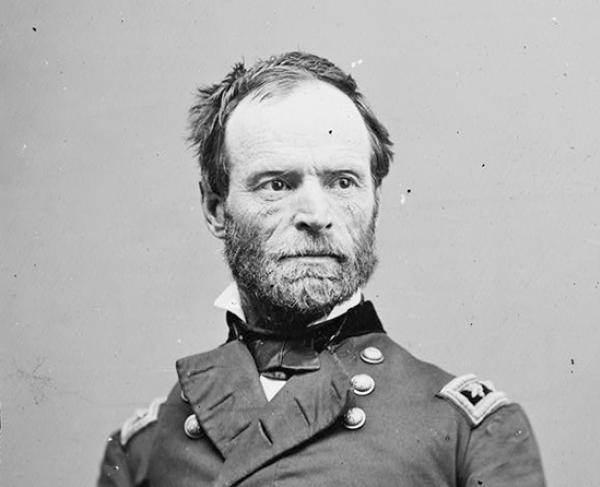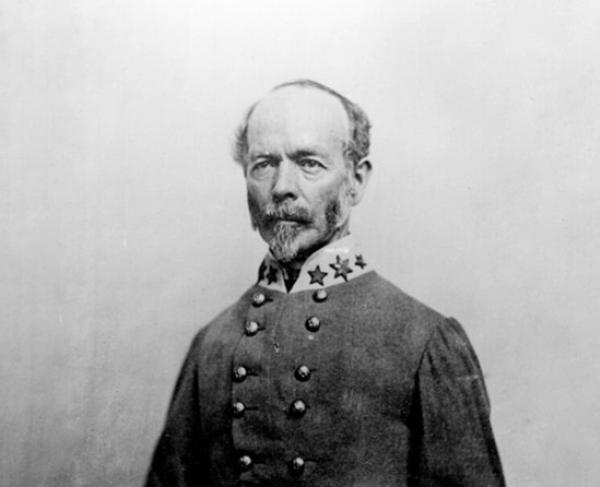Cobb County, GA | Jun 15 - 17, 1864
The death of Confederate Lt. Gen. Leonidas Polk on June 14 and his observation of the enemy lines led Gen. Joseph Johnston to order William Bate in the night of June 14-15 to withdraw from Pine Mountain back into the main Confederate line. The next day Maj. Gen. George Thomas' troops advanced, occupied the abandoned enemy works, and pushed farther south along the Sandtown road. At 2 p.m. the Federals approached the main Confederate line. Its center, near Gilgal Church, was held by Maj. Gen. Patrick Cleburne's division.
Sherman ordered Thomas to throw a "strong well appointed column of attack" against the Rebel line. All three divisions of Thomas' corps were active that afternoon. At 3 p.m. Newton's division of Maj. Gen. Oliver O. Howard's corps moved forward, drove in the Rebel skirmishers but then found the enemy fortified lines too strong to advance against any farther. Hooker's Twentieth Corps also tested the Rebel works. Brig. Gen. John Geary's division charged across a field marked by abatis and chevaux-de-frise. Several hours of trying to break the enemy line till darkness led to nothing more than casualties, which Geary counted as 82 killed, 432 wounded, and 5 missing.
Maj. Gen. Dan Butterfield's Twentieth Corps division advanced against entrenchments held by Cleburne's Confederates. Federals drove in the Rebel skirmishers but faltered under heavy fire from Cleburne's line. Capt. Samuel Foster commanded the 24th Texas along with Capt. Richard Goldthwaite's Alabama battery of Napoleons in the area behind the small wooden Baptist church. "Later in the afternoon the enemy drive in our skirmishers," wrote Forster, "and the battery men and men from our Regt. all go to work and tear that church down level with the ground in about 15 minutes, not one log left on another, even knocked the blocks, and just as the Yanks came in sight about 300 yards away they open on them with grape shot, and canister, and they soon break and run out of sight." "We repulsed him as usual," wrote Capt. Calhoun Benham of Cleburne's staff.
Actually, Captains Foster and Benham were not quite right. The Federals were not so much repulsed as stopped and pinned down by heavy musketry and cannon fire. Capt. Thomas Key's Arkansas Battery joined in the firing. Col. Benjamin Harrison's 70th Indiana was one such regiment. One of Harrison's men described the Rebel fortifications as "as strong as science and labor could make them." For almost two hours the Hoosiers sought cover in the woods under punishing fire. "The broken nature of the terrain," wrote one historian of the battle, "was all that saved the Federals from a full scale disaster."
During the night the Northerners dug in where they were, so that on the morning of the 16th the opposing lines at Gilgal were unusually close. Heavy skirmishing took place throughout the day, so that the "action"—it wasn't really a full-scale battle—is usually counted as two days of fighting, June 15-16. Union casualties were significant but not heavy. Butterfield's division alone lost 25 to 40 dead and from 135 to 175 wounded. Cleburne's loss was not reported by much lighter.
During the afternoon of June 16, elements of Maj. Gen. John M. Schofield's Twenty-third Corps, probing on the Union right toward Lost Mountain, advanced to a position which enfiladed Cleburne's works at Gilgal Church. In the afternoon Federals brought up artillery and soon were shelling Cleburne's lines. This development, plus news that the enemy were threatening to turn his left at Lost Mountain, led Johnston to order Lt. Gen. William Hardee to withdraw during the night from lost Mountain and Gilgal Church back several miles to a new line west of Mud Creek. Forty-eight hours later, the army fell back again to a line erected by engineer Col. Stephen Presstman anchored on Kennesaw and Little Kennesaw Mountains.
Gilgal Church: Featured Resources
All battles of the Atlanta Campaign
Related Battles
100,000
65,000
650
450







